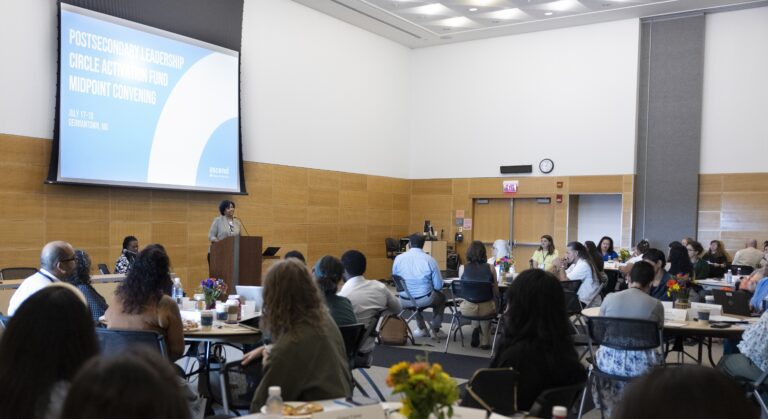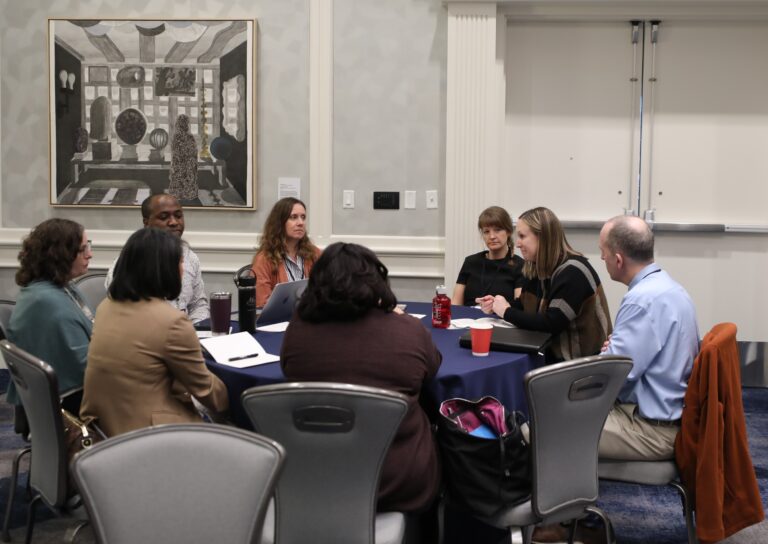Race and Belonging in America: My Identity as an Asian American Adoptee
On March 16, 2021, eight people, six of whom were Asian women, died in a targeted mass shooting of three Asian-owned businesses in Atlanta. I walk through this world as an Asian American woman and adoptee. I knew this day was coming. As a woman of color raised by a white family in a predominantly white community, I have a unique perspective on race and racism in America – one that is often overlooked. As Ascend at the Aspen Institute celebrates Asian American Pacific Islander Heritage Month this May, I share my story to shed light on the AAPI community and stress the importance of centering racial and gender equity in our policies and systems.
Although I was raised by a white family, I never grew up feeling white. People in my school, work, and community constantly reminded me that I was Asian. When we hear the word racism, we often evoke its most staggering forms, such as violence and hate crimes. However, racism permeates every facet of our lives in subtle yet pernicious ways, making it harder to recognize and ultimately eliminate. From racial stereotyping and disparaging humor to harmful microaggressions and brazen harassment, my experiences made it clear that white is always the default, and being different made me a target. I will never forget the boy in middle school who screamed, “Go back to where you’re from!”, or the girl in high school who told me I’m “not American.” I recall the adult who gave me a disgusted look and addressed me as “you people”; not to mention the innumerable times I’ve been mistaken for another person of color, or when my mere presence has been ignored entirely. But what I remember most of all is the way my peers shifted uncomfortably when I talked about my race or ethnicity, and the persistent othering I experienced as “the Asian” in the room.
Every person of color experiences racism differently. For transracial adoptees, racism is often experienced in a way that is deeply isolating. Adoption does not equal assimilation, nor does assimilation equate to protection. Being raised by a white single mother did not shield me from ugly forms of racism, nor could my family relate to the prejudices I’ve experienced through life or the struggles I face now as a woman of color in the professional world. Transracial adoptees are often unable to process their feelings with family members who, no matter how loving, cannot understand or fight a form of prejudice they have never experienced. It is a unique burden to find oneself educating others about racism, realizing that bias does not necessarily end at home.
In order to feel accepted and included, I learned early to distance myself from my racial and ethnic identity. When I was younger, in the few instances I spoke up about racist encounters to people in power, little concern was given. “Just ignore it,” I was advised. “I’m sure that’s not what they meant.” As a child, I used to believe I never experienced racism – now as an adult, I realize I had normalized it. My survival as a child stemmed from my ability to accept and dismiss the racism I faced every day. As I grew older, however, I became very aware of racism and all its hidden wounds.
Stereotypes, harassment, jokes, rhetoric – when we don’t call out these abuses, even if they seem devoid of ill-intent, we create the backdrop for something far more dire. The COVID-19 pandemic helped expose the ways in which xenophobic rhetoric such as the epithet “China Virus,” which connects Asian Americans to the spread of coronavirus, neatly correlates with the recent wave of anti-Asian hate crimes. This past year violence against Asian Americans has increased by nearly 150%, and the recent shooting in Atlanta is just one example. But anti-Asian racism isn’t new. Beginning with the first arrival of Asian immigrants in this country, centuries of discrimination have led to this moment, and it certainly won’t disappear once the pandemic concludes.
Furthermore, it’s critical to note that women are disproportionately impacted by anti-Asian harassment and violence. According to officials after the shooting in Atlanta, the perpetrator was motivated not by a racial bias but a “sexual addiction” and saw these women as a “temptation to eliminate.” However, what this statement ignores is that racism and sexism are inextricably intertwined. One cannot disconnect this violence from the racial stereotypes that people attach to Asian women. Deeply rooted in our nation’s history, the sexualization and dehumanization of Asian women has resulted in a culture of violence today.
Asian Americans are likewise invisible in large part because our education system does not formally teach about our history, activism, and struggles. As a result, there’s a tendency to disbelieve that discrimination against Asian Americans exists. After the shooting in Atlanta, I read countless news stories reporting that it was unclear whether the act could be categorized as a hate crime. The sheriff’s spokesman declared the man who murdered the six Asian women was simply having “a bad day.” How much more violence must occur for Asian Americans to be worthy of national reckoning?
The model minority myth, although presumably innocuous, also plays a damaging role. Painting an entire group as high-achieving and well-educated not only attempts to pit minority groups against one another, but also obscures the vast diversity of the AAPI community. Tracing our origins to over 40 different countries and ethnic groups that speak over 100 languages and dialects, we encompass everyone from refugees and recent immigrants to fifth-generation Americans. The six Asian women who lost their lives while working at the spas in Atlanta were likely some of the most vulnerable among us, yet the model minority myth erases the realities of all those who live on the margins in precarious occupational, economic, or undocumented circumstances. These stories are left untold.
The AAPI experience needs to be learned, understood, and emphasized, along with the experiences of Black, Latinx, and Indigenous people, as well as other communities of color, to undo a culture of white supremacy. Ascend at the Aspen Institute is committed to addressing structural problems that create gender and racial disparities, and lifting up the stories of families to combat these inequities. I share my story to underscore that without a racial and gender equity lens, we risk missing important nuances in people’s stories which inform good policy and practice. As more leaders and policy makers apply this lens, our systems and structures will better reflect the needs, strengths, and complexities of all families.
After my first year of college, I traveled alone to China for the first time since my birth. Living with a host family and teaching English to Chinese students at a rural elementary school, I bore witness to my lost culture, language, and heritage. I felt so deeply proud to be Asian. Even in this period of heightened discrimination and fear, it’s now a part of myself that I love unconditionally. But with this new pride also came heartbreak. I realized that I was unable to grow up embracing who I am. In America, I am a foreigner. Nevertheless, to everyone in China, despite my physical characteristics, I am blatantly American. I’ve accepted the fact that I’ll probably never feel like I truly belong anywhere. But I think that’s the most beautiful thing about being a transracial adoptee – holding these seemingly contradictory, disparate, complicated truths, in the same body, always.
Lily LaMattina is an Intern with ASCEND at the Aspen Institute. She is also an Intern with the Aspen Institute’s International Partners.
Related Posts





